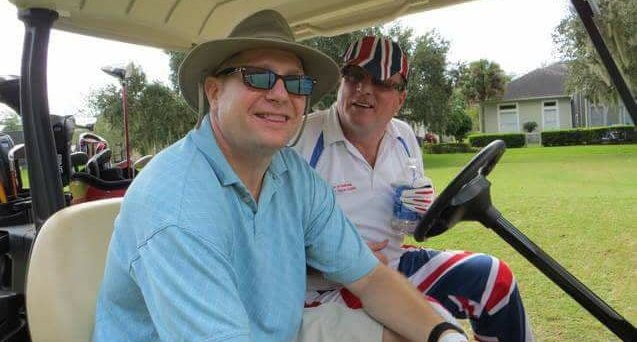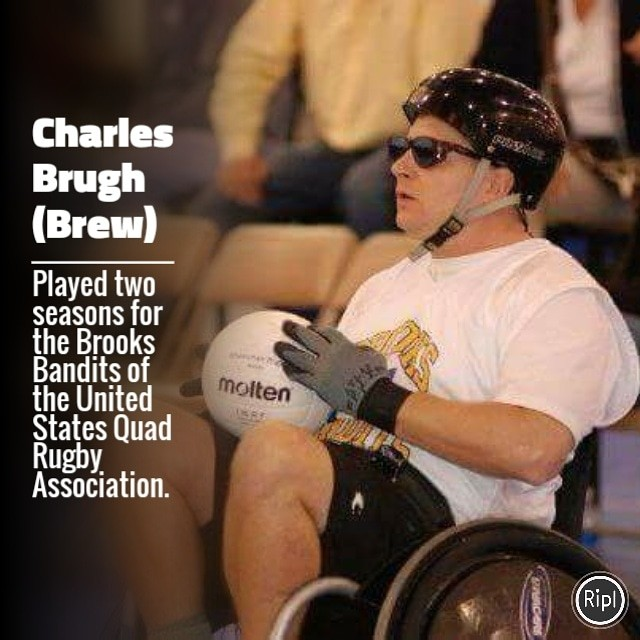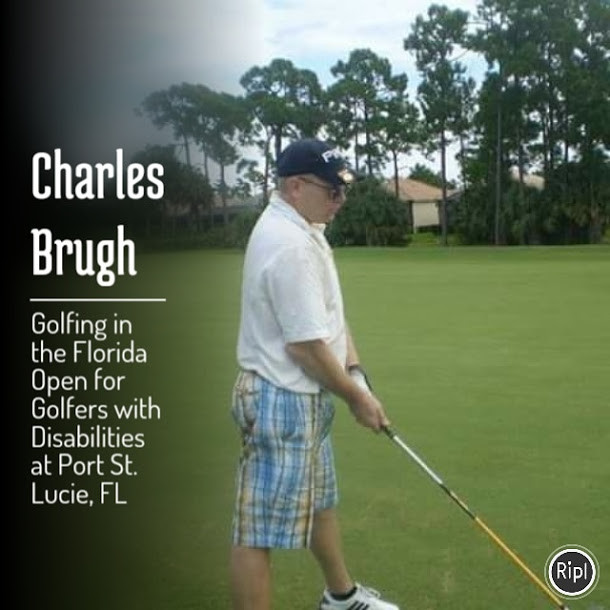Golfer Spotlight with Rich O'Brien
Golf - A Positive and Meaningful Therapeutic Modality
By Rich O’Brien
 Thirty-two years ago, Charles Brugh suffered a severe brain injury in an automobile accident in Ponte Vedra Beach, FL. Without a moment to spare, he was flown by LifeFlight to Jacksonville’s Level I Trauma Center where he remained in a deep coma for two weeks in the Critical Care Unit. The accident would test his faith and change the course of his life.
Thirty-two years ago, Charles Brugh suffered a severe brain injury in an automobile accident in Ponte Vedra Beach, FL. Without a moment to spare, he was flown by LifeFlight to Jacksonville’s Level I Trauma Center where he remained in a deep coma for two weeks in the Critical Care Unit. The accident would test his faith and change the course of his life.
He emerged from his coma with a broken brain, legally blind for several months, and also experiencing paralysis from the neck down for several weeks. After being released from the ICU, he was transferred to a rehabilitation hospital where he would spend the next six months participating in an intensive program to help him relearn every basic life function including how to walk, talk, think, sleep, swallow, feed and bathe himself. After being released from the hospital, he continued as an outpatient in the program for an additional 18 months.
It was then that, “Brew” as he is known by his friends, developed the survivor's mindset that he follows to this day: 1) Always push yourself beyond your preconceived limits; 2) Never give up; for it is the one that endures that final victory comes!
Despite battling severe memory challenges, he completed an exhaustive study about the brain and came to realize two critical things; 1) that no two brains are exactly alike; and 2) that every brain injury is unique in scope and severity. He determined that in order to rehabilitate his broken brain he needed to engage in as many adaptive sports as possible to promote neurogenesis by using moderate-to-intense aerobic training. In technical terms, he would use activity dependent plasticity to promote both functional and structural plasticity.
Golf was always his passion before his near fatal injuries and it was also the first adaptive sport he attempted. He quickly realized, however, that a golf swing required far more coordination than he was capable of at the time, in fact, he called himself “an uncoordinated buffoon.” He knew that a return to golf would have to wait until he channeled his rehabilitative efforts to less complex activities which could serve as stepping stones for his return to the game he loved. 
Over the past thirty-two years, he has obsessively engaged in a diverse array of spiritual, cognitive, and physical labors that pushed the limits of his faith, drive, talent, intelligence, and strengths of character. To date, Brew has engaged in twenty-one distinct adaptive sports. A sampling of his diverse rehabilitative athletic efforts include: several multi-day whitewater rafting and camping trips, rock climbing (Breckenridge, Colorado), several multi-day cycling tours, adaptive water skiing/knee boarding, adaptive tennis, adaptive surfing, parasailing, hand cycling, adaptive alpine skiing, and adaptive rowing. He was also a charter member of the Brooks Bandits of the United States Quad Rugby Association and finished seventh at the 2010 World Cup Indoor Rowing Championships in Boston.
The other key element of Brew’s amazing recovery has been his faith. He adds; “I often tell God how grateful and blessed I am to have been given the strong will, loving parents, and an abundant inner strength that permits me to figure out how to fix my severely broken brain.Through the clarity of hindsight, I have been blessed by my misfortune! It has required many years of foolish mistakes, a great deal of pain, and incredible sacrifice and suffering by both myself and my loving family to reach this momentous point.”
 In 2007, after nearly two decades of focused efforts, he FINALLY was able to return to the game. He was thrilled to be able to play golf again and continued to push himself beyond his preconceived limits. He continued playing for nearly a decade before a series of joint issues required multiple surgeries and extensive recovery time which again forced him off the course for over six years.
In 2007, after nearly two decades of focused efforts, he FINALLY was able to return to the game. He was thrilled to be able to play golf again and continued to push himself beyond his preconceived limits. He continued playing for nearly a decade before a series of joint issues required multiple surgeries and extensive recovery time which again forced him off the course for over six years.
Over the past year, Brew has been making the trip from Jacksonville, FL to Charleston, SC one Saturday a month in order to participate in our HERO Clinics at Wescott Golf Club. To assist with his balance and to help him rebuild lower body and core strength, he has been using the paramobile as a standing frame to help him maintain his balance. He feels like he is making good progress and that his balance is improving. As a fellow survivor of a serious brain injury, it has been my honor to mentor Brew and give him back the gift of golf. We both look forward to the day when Brew will be able to stand up on his own when he plays.
The fact that golf requires so much mind-body integration is precisely why Brew believes that the sport is such tremendous therapy for TBI survivors. He hopes that others recovering from TBIs might be encouraged by him sharing his story of how his passion for golf and his enduring faith allowed him to make an improbable comeback. Brew adds, “I consider golf the equivalent of graduate study in neurological rehabilitation at a prestigious university.
I implore my fellow survivors of brain injuries to pick up a club and give it a shot because, if done consistently as part of an overall therapeutic regimen, the game will greatly enhance both your rehabilitation and your life. From my extensive personal experience, I can say with absolute certainty that golf as a therapeutic modality is positive and meaningful.”
I couldn’t have said it better myself.
**************************
About the Author
Rich O’Brien is a member of the Board of Directors for the National Alliance for Accessible Golf. Rich is a golf writer who tells the stories of golfers who use golf as therapy to recover from their injuries, illnesses, or challenges. Rich survived a complex polytrauma that included a broken back, a broken neck, four skull fractures, and brain damage in every lobe of his brain. Golf therapy was a big part of his own recovery. Now he is an advocate for individuals with disabilities.
